Amid conflict, Latvia leads Baltics in felling Soviet memorials
The momentum to remove Soviet monuments has gathered pace during Russia’s war on Ukraine, but the issue remains divisive.
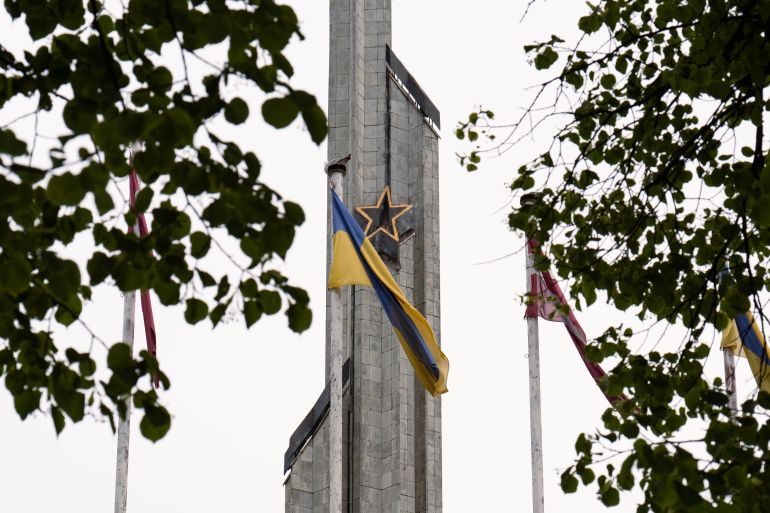
Near the old town area of Riga, a 79-metre (259 feet) column commemorates the Red Army’s victory over Nazi Germany in Latvia.
On one side, there is a trio of statues – chiselled, solid-limbed soldiers. On the other, a woman, the “Motherland” embodied, her arms held high.
Keep reading
list of 3 itemsSoviet nostalgia on Ukraine’s impoverished front line
The Last Soviet Generation
Over the years, the site has often been covered with flowers as tributes were paid. In 1997, Latvian nationalists tried to blow it up.
If you think the Riga Victory Monument, built in 1985, sounds like it is worth a visit, you’re out of luck. It is currently sealed off to the public by police. By November 15, it will be gone.
It is one of at least 70 Soviet-era monuments, memorials or plaques set to disappear from public space in the coming months in Latvia.
A new law, triggered by Russia’s invasion of Ukraine, empowers local authorities to remove about 300 sites. The exact total is yet to be determined.
Dismantled objects are to be entrusted to museums or potentially destroyed.
It is a sudden break with the past but it has been a long time coming. Since the dissolution of the Soviet Union in 1990-1991 ushered in independence in Eastern European states, the debate about these monuments has flared up cyclically.
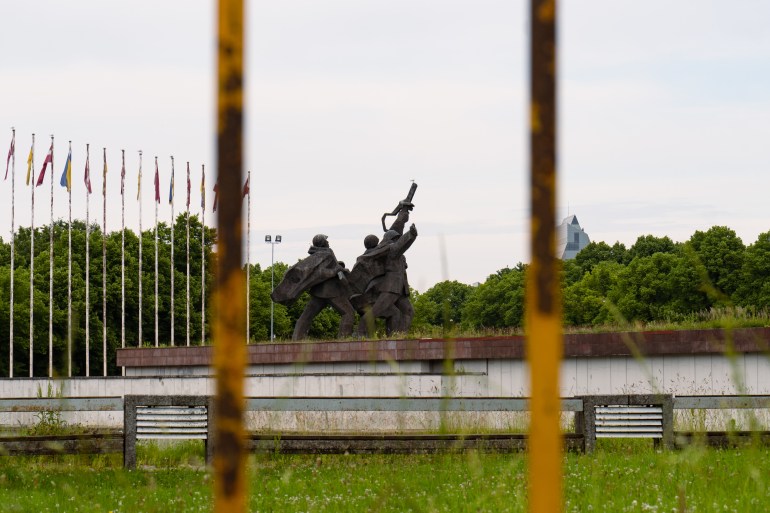
In the 90s, Latvia rid itself of dozens of Leninist memorials.
Riots rocked the Estonian capital in 2007, when the “Bronze Soldier” statue was moved to a war cemetery.
In 2016, the Polish government ordered hundreds of sites to be pulled down.
And in 2020, the Czech Republic rewrote the plaque of a Prague statue honouring Russian Marshal Ivan Konev and later moved it entirely.
Removals such as these have irked Moscow.
In the three Baltic states, which were occupied in turn by Nazi Germany and the USSR during World War II, the debate boils down to two competing views of history – and one question: liberation or occupation?
For many Latvians, Estonians and Lithuanians, Soviet war monuments represent both the defeat of the Nazis and the decades of painful USSR occupation that followed, marked by mass deportations to gulags and political repression.
For others, mainly from the Russian-speaking minorities that make up around a quarter of Latvia and Estonia’s population and 5 percent of Lithuania’s, they honour the soldiers who fought against Nazi fascism.
Like Latvia, a similar mood is taking hold in neighbouring Estonia.
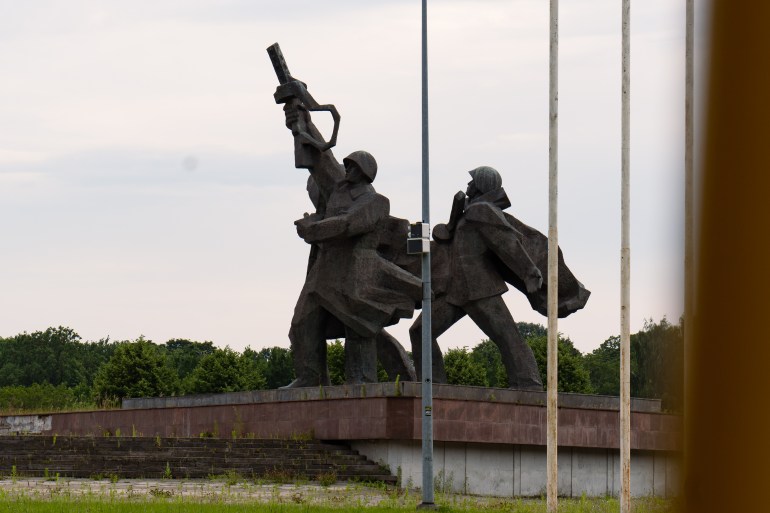
In recent months, a dozen Estonian municipalities have officially expressed interest in relocating memorials containing bodies of Red Army soldiers to war cemeteries, according to Hellar Lill, the director of the Estonian War Museum.
“The Soviet authorities used the dead to give an ideological monument the sacredness of a tombstone,” he told Al Jazeera via email.
An excavation last month in the town of Otepää revealed no human remains were actually buried there, according to Lill.
The mayor of one such municipality, Pärnu, said locals have called for a monument in a park to be removed for years.
“Our people have suffered during occupation and our people would not like to be reminded of this time,” Romek Kosenkranius said via email.
For the Latvian government, Moscow’s war in Ukraine was a red line, according to Arvils Ašeradens, the chairman of the parliamentary committee overseeing the memorial law.
The invasion has made things more black and white, he said, adding: “You are [either] supporting [Russian President Vladimir] Putin’s regime, or you are against Putin’s regime.”
While respect for the victims of World War II is universal, “we don’t want to have propaganda monuments that glorify the Red Army,” Ašeradens said in a phone call.
He sees the modern Russian military as a continuation of Soviet forces.
But this is not a view shared by the Latvian Russian Union, a party with no deputies in the national parliament but one in the EU legislature.
“More than 150,000 Soviet soldiers perished in the fight for the liberation of Latvia,” a petition launched by the party against the new law states.
“Almost every Russian-speaking family in Latvia as well as many Latvian families cherish the memory about the victims of that war and their ancestors who fought on the side of the anti-Hitler coalition.”
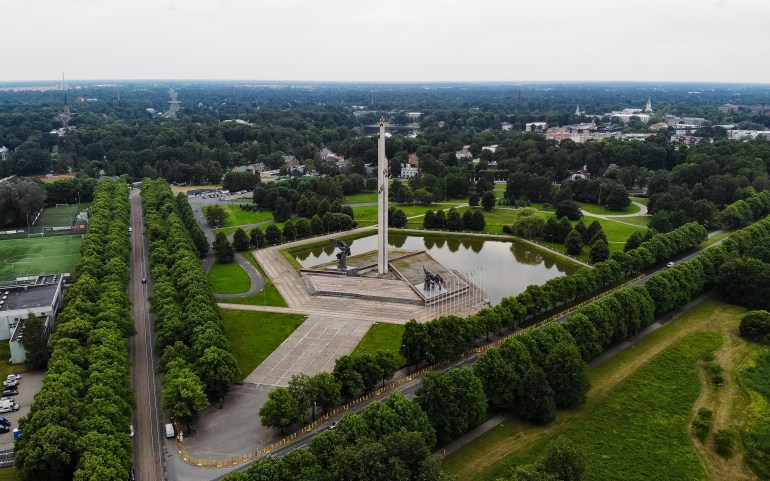
The two stances seem irreconcilable.
But Dmitrijs Andrejevs, a researcher at the University of Manchester in the United Kingdom, cautions that while surveys confirm the division, the views associated with each community are “far from monolithic“.
Moreover, few monuments have the emotive power of the Riga Victory Monument or the Tallinn Bronze Soldier, Andrejevs said.
Comparable sites often escape attention. One statue honouring USSR soldiers in the Estonian town Kärdla (nicknamed “Stone George”) became part of a school leavers’ ritual; local kids would wash him with beer, the researcher said.
Among Russian speakers, views depend on where one was born, Andrejevs said: “Younger generations are much more likely to engage with simultaneous, hybrid memories of both ‘liberation’ and ‘occupation’.”
The children and grandchildren of Russian settlers who came to the Baltic region in the 20th century, often for work, may speak Russian at home or (up to a certain age) at school, but they often see things differently to their grandparents.
Andrejs, 39, is a Russian-Latvian born in Riga.
He understands that for “native Latvians”, who make up the majority of his social circle, the Victory Monument “is a symbol of occupation and always was”.
But personally, he does not feel strongly about it.
He would rather see signs added to put the monument in context than remove it.
“It was erected by the Soviet state, but as a monument for winning the [World War II], not for Latvia becoming part of the Soviet state.”
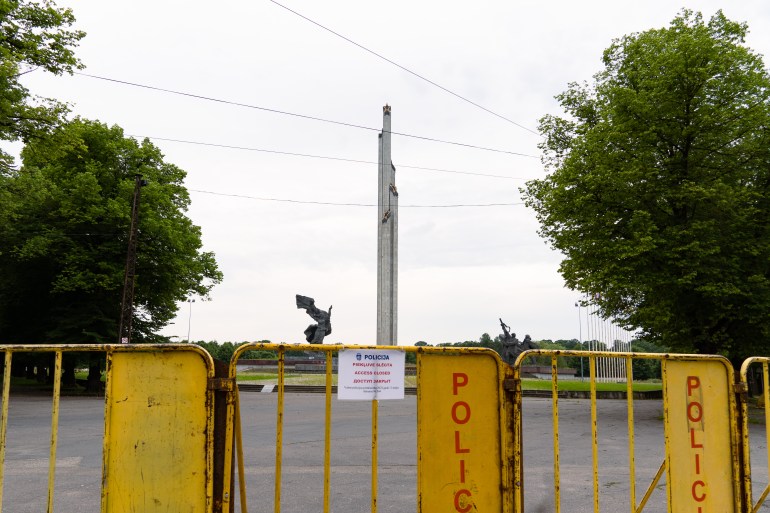
Because of the Ukraine war, the room for ambiguity in public spaces is dwindling.
All three Baltic countries recently banned certain Russian media in their countries. The future of Russian-language education is also subject to debate. Russian speakers often have lower educational and professional attainment than their peers, linked to insufficient mastery of the main national language.
Within the Russian minority community, it is a polarising time.
None of Andrejs’ Russian-Latvian contemporaries supports the present war in Ukraine, he said, but many of his friend’s parents back Moscow do. While his parents do not, a lot of families are in conflict over the topic.
The situation is similar in Estonia, according to Stas, a 30-year-old Russian-Estonian.
Speaking on the phone from Tallinn, Stas explained that he grew up “kind of segregated, but not in an aggressive South African way of racial segregation.”
His neighbourhood was mostly Russian, as were his classmates and teachers. Over time, he felt the societal divide became less pronounced. Then Russia invaded Ukraine.
Now he sees polarisation not just in the Russian minority but in Estonia in general.
When the war broke out, he saw “ridiculous” anti-Russian sentiment spread by Estonian nationalists online and the same thing going on in Russian-language forums.
Both Stas and Andrejs feel that certain politicians play up the issues.
“I see politicians sometimes that are actively trying to prevent any kind of constructive dialogue,” said Stas.
While the long-term effect of the Ukraine war on societal reconciliation remains to be seen, the fate of the Riga Victory Monument is sealed.
“There will be no delay on the part of the municipality and all the necessary procedures will be carried out as soon as possible,” Riga City Council said.
When will it go and where will it end up, this reporter asked. The answer: No comment.